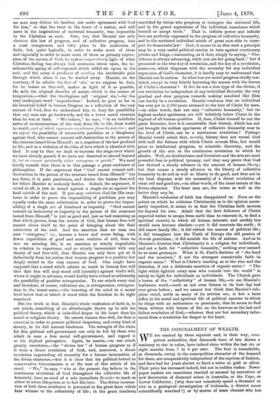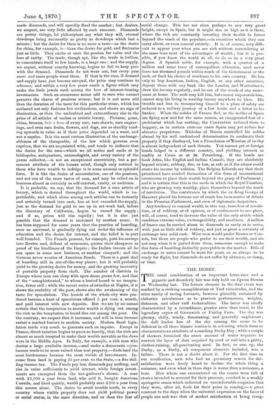THE CONCEALMENT OF WEALTH.
WE are assured by three separate and, in their way, com- petent authorities, that diamonds have of late shown a. tendency to rise in value, have indeed risen within the last six or eight months from 7 to 8 per cent. The fact is remarkable, as diamonds, owing to the cosmopolitan character of the demand for them, are comparatively independent of the caprices of fashion, and have had for years almost as fixed a value as gold or silver. Their price has increased indeed, but not in sudden rushes. News- paper readers are sometimes startled or amused by narratives of new discoveries of diamond mines in Australia, or the Cape, or Lower California ; [why does not somebody spend a thousand or- two in a geological investigation of Golconda, a district never- scientifically searched?] or by stories of some chemist who has made diamonds, and will speedily flood the market ; but dealers, we suspect, are very little affected by such rumours. Diamonds are pretty things, let philosophers say what they will, eternal dewdrops being necessarily as pretty as dewdrops which last a minute ; but the desire for them is no more a taste—as the desire for china, for example, is—than the desire for gold, and fluctuates just as little. They excite at once the passion for value and the love of rarity. The trade, though apt, like the trade in bullion, to concentrate itself in few hands, is a large one ; and the supply, we expect, without exactly knowing, begins to fail to keep pace with the demand. Diamonds do not wear out, but every year more and more people want them. If that is the case, if demand and supply have just become unequal, the price may continue to advance, and within a very few years reach a figure which may make the little jewels rank among the best of interest-bearing investments. Such an occurrence seems odd to men who cannot perceive the charm of precious stones ; but it is not more odd than the duration of the taste for this particular stone, which has outlasted not only fashions but civilizations, and shows no sign of diminution, or than the undoubted and extraordinary rise in the price of all articles of useless or artistic luxury. Pictures, gems, china, bronzes, brie a brae of every sort, rare shawls, rare engrav- ings, and even rare fruits, flowers, and dogs, are as steadily tend- ing upwards in value as if their price depended on a want, and not a caprice. It is the most curious illustration of the unchange- ableness of the changeable, of the law which governs even caprices, that we are acquainted with, and tends to indicate that the desire for the rare—which we all notice and smile at in bibliopoles, antiquarians, entomologists, and every variety of the genus collector,—is not an exceptional eccentricity, but a per- manent attribute of the human mind, though only noticed in those who have wealth to indulge it in some unusual or splendid form. It is like the desire of accumulation, one of the passions, and not one of the mere tastes of men, and may be relied on in business almost as certainly as self-interest, vanity, or ambition.
It is probable, we say, that the demand for a rare article of luxury, which is desired throughout the world, which is im- perishable, and which alone among such articles can be instantly and certainly turned into cash, has at last exceeded the supply, just as the demand for gold to use up in art-work had, before the discovery of California, begun to exceed the supply ; and if so, prices will rise rapidly ; but it is also just possible that the demand is increased by another cause. It has been supposed for some years that the practice of hoarding, once so universal, is gradually dying out under the influence of education and the desire for interest, and the belief is in part well founded. The French peasant, for example, puts his savings into Rentes, and, defiant of economics, quotes their cheapness as proof of the kindliness of the Empire ; the Italian invests all he can spare in some new business, or another vineyard ; and the German never wearies of American Bonds. There is a good deal of hoarding still in out-of-the-way places ; but it will probably yield to the growing desire for money, and the growing insecurity of portable property from theft. The number of districts in Europe where men can sleep with open doors grows few, and that of the "unsophisticated," to whom a buried hoard is no tempta- tion, fewer still ; while the recent series of swindles at Naples, if it shows the credulity of the poor, shows also the awakening of the taste for speculation. The hoards of the whole city were pro- duced because a knot of speculators offered 5 per cent, a month, and paid interest with new deposits. But we are by no means certain that the temptation to secrete wealth is dying out among the rich as the temptation to hoard dies out among the poor. On the contrary, we suspect that it increases, and will in time become rather a marked feature in modern society. Modern fiscal legis- lation tends very much to generate such an impulse. Except in France, direct taxation begins to press so heavily, that the rich are almost as much tempted to make their wealth movable as the Jews were in the Middle Ages. In Italy, for example, a rich man who desires a large available income,—and under a democratic regime income tends to be more valued than real property,—finds land the most burdensome because the most visible of investments. In- come from land is paying 25 per cent. to the State,—a five shil- ling income-tax. The Funds pay less, diamonds pay nothing, and rise in value sufficiently to yield interest, while foreign invest- ments are exempted from the tax-gatherer's shears. A man with /1,000 a year from land, who sold it, bought American Consols, and lived quietly, would probably save /200 a year from this source alone. The desire to avoid trouble tends, in every country where visible property does not yield political power or social-status, in the same direction, and so does the fear of social change. This has not risen perhaps to any very great height, except in Spain, but it might rise as high as it is there, where the rich are constantly investing their wealth in forms beyond the reach of the populace,—in securities which they can carry about, or even conceal entirely. It is, of course, very diffi- cult to appear poor when you are rich without surrendering at the same time most of the advantages of wealth ; but it is pos- sible, if you know the world at all, to do so in a very great degree. A Spanish noble, for example, with a quarter of a million and some trace of cosmopolitan education, need never leave ten thousand pounds within reach of the Government or the mob, or limit his choice of residence to his own country. He has only to buy American, Indian, English, or any other securities, deposit them with any bank like the London and Westminster, draw the income regularly, and be out of the reach of any move- ment at home. The mob may kill him, bat cannot impoverish him, cannot stop his living in wealthy luxury anywhere he likes. his trouble and loss in transporting himself to a place of safety are reduced to a railway journey of a few hours and a letter to his banker. When the nobles of France fled, as the nobles of Spain are flying now and for the same reason, an exaggerated fear of a proletariat which has nothing, the Convention reduced them to beggary, as in certain extreme cases Spain may yet reduce her absentee proprietors. Nicholas of Russia controlled his nobles abroad by his well understood determination to confiscate their property if they disobeyed, but a Frenchman oriltussian of to-day is almost independent of such threats. You cannot get at foreign bonds lodged in a different country, and yielding interest as readily at Como as at St. Petersburg. If the bonds are book debts, like English and Indian Consols, they are absolutely beyond seizure, robbery, fire, or loss, as safe as if the owner could create his income by volition. The Belgian Liberals say that their priesthood have availed themselves of this form of international intercourse to place their wealth beyond the grasp of Parliament ; and it is certain that this is the mode in which the Royal Families, who are growing very wealthy, place themselves beyond the reach of revolution. The contrivance by which the ex-King George of Hanover placed his fortune out of reach has been matter of debate in the Prussian Parliament, and even of diplomatic despatches.
Any tendency to conceal wealth in this way, from fear of revolu- tion, or of robbery, or of opinion, or of confinement to one place, will, of course, tend to increase the value of the only article which combines extreme value, exchangeability, and smallness. A million of francs can be carried about in diamonds as easily as in notes, with just as little risk of robbery, and just as great a certainty of exchange into solid cash. Wise men would prefer Rentes or Con- sols, but there are people who prefer to see their wealth, and are not easy when it is parted from them, numerous enough to make this form of hoarding distinctly perceptible in the market. Bills of exchange or notes cannot be worn for years so as always to be ready for flight, but diamonds do not suffer by abrasion, or damp, or time.































 Previous page
Previous page